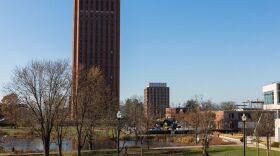A viral video of UConn students at a recent campus dorm party brought a swift rebuke from the university. But both the party itself and the school’s official response are raising more questions about whether students should be back at school.
A young woman drinking from a red Solo Cup features in the shot. Then the person taking the video pans the camera across the room, revealing people gathering without observing social distancing. No one is wearing a mask. After the video came to light, the University of Connecticut revoked housing for those who disregarded university policies put in place to mitigate the risk of COVID-19.
A UConn spokesperson told Connecticut Public Radio that its student code of conduct “includes a prohibition on behavior that could endanger others,” hence the housing ban.
Punishing the students for bad behavior but then sending them away from the UConn bubble into the larger population amounts to “rearranging deck chairs on the Titanic,” said Gregg Gonsalves, a Yale assistant professor of epidemiology.
“The point is that if someone is exposed potentially to SARS-CoV-2, they need to be isolated and tested and after 14 days can go back to their dorm room or their off-campus housing,” Gonsalves said. “Throwing somebody off campus is booting the problem to your local community basically.”
UConn confirmed that it won’t be isolating the students and that the state Department of Public Health won’t require it.
“DPH will continue to work with all of our CT colleges and universities on the best available public health strategies to minimize the risk of COVID-19 outbreaks,” said DPH spokesman Av Harris in an emailed statement.
Harris said the responsibility of enacting COVID-19-related policy on college campuses lies with Mark Ojakian, president of the Connecticut State Colleges & Universities system. Ojakian has weighed in on the party, commending UConn for its punishment of the students.
“[It] sends a message that this is serious,” Ojakian said in a recent Connecticut Public Radio interview.
“This is not just about your ability to have fun and party, but it’s about your responsibility to keep folks safe.”
Connecticut Public Radio reached back out to the CSCU system to find out whether it would ever have a school like UConn reverse course and take responsibility for isolating students who may have been exposed. A spokesperson said that’s up to UConn.
Gonsalves, the Yale epidemiologist, believes the situation illustrates the lack of a solid plan from UConn’s leadership. He said Gov. Ned Lamont should step in and mandate that UConn take on a full remote learning model.
“We need to think clearly about whether we really have what it takes to keep our community safe, or we’re sort of doing a bit of wishful, magical thinking because we’re all desperate to get back to normal,” Gonsalves said.
The University of Connecticut didn’t participate in an interview for this story.
Gonsalves said institutions should probably test students two or three times a week to avoid an outbreak. But even if everything “breaks right,” it still may not be possible to keep COVID-19 from local colleges and universities, he said.
Copyright 2020 Connecticut Public Radio








